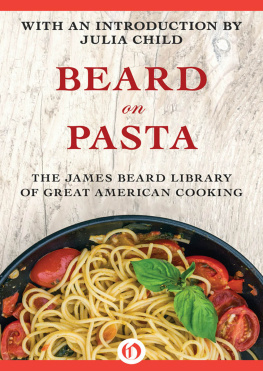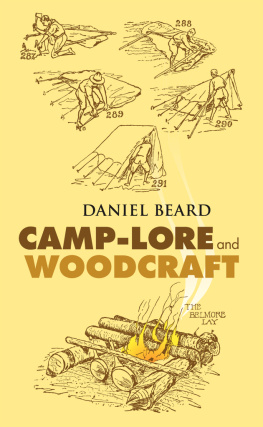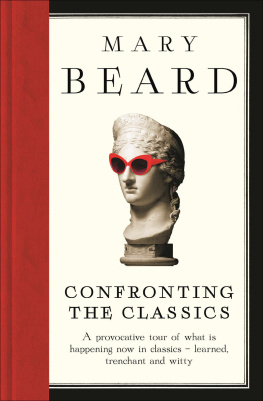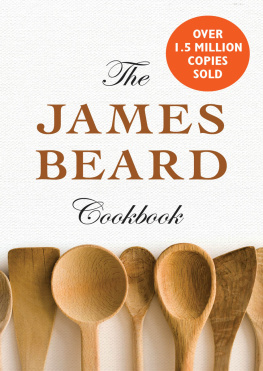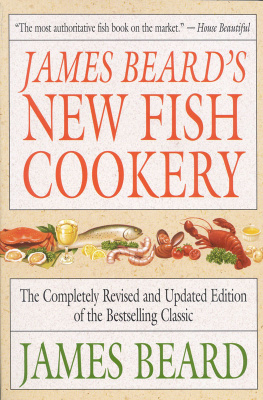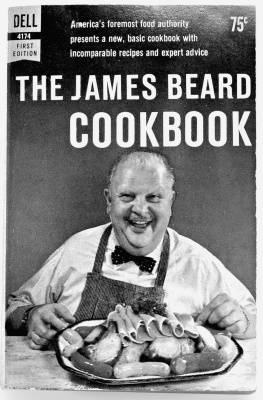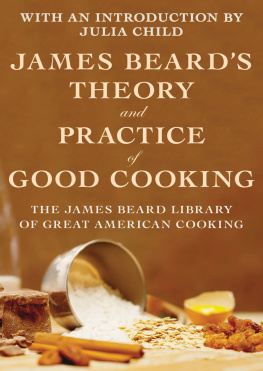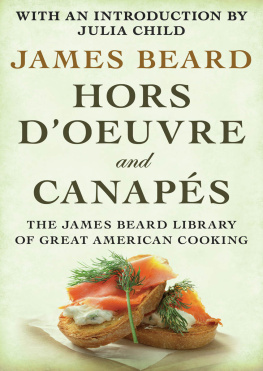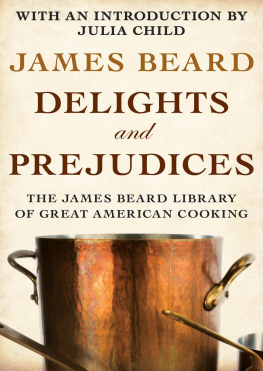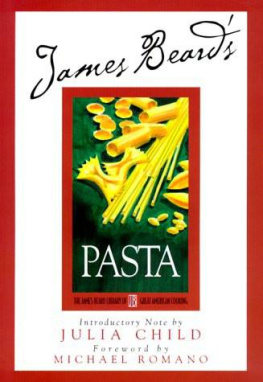BEARD - James Beards American Cookery
Here you can read online BEARD - James Beards American Cookery full text of the book (entire story) in english for free. Download pdf and epub, get meaning, cover and reviews about this ebook. year: 2009, publisher: Little, Brown and Company, genre: Home and family. Description of the work, (preface) as well as reviews are available. Best literature library LitArk.com created for fans of good reading and offers a wide selection of genres:
Romance novel
Science fiction
Adventure
Detective
Science
History
Home and family
Prose
Art
Politics
Computer
Non-fiction
Religion
Business
Children
Humor
Choose a favorite category and find really read worthwhile books. Enjoy immersion in the world of imagination, feel the emotions of the characters or learn something new for yourself, make an fascinating discovery.

- Book:James Beards American Cookery
- Author:
- Publisher:Little, Brown and Company
- Genre:
- Year:2009
- Rating:3 / 5
- Favourites:Add to favourites
- Your mark:
- 60
- 1
- 2
- 3
- 4
- 5
James Beards American Cookery: summary, description and annotation
We offer to read an annotation, description, summary or preface (depends on what the author of the book "James Beards American Cookery" wrote himself). If you haven't found the necessary information about the book — write in the comments, we will try to find it.
Food and eating habits have fascinated me throughout my life, and after sixty-five years I have come to the conclusion that perhaps American cookery is one of the most fascinating culinary subjects of all.
BEARD: author's other books
Who wrote James Beards American Cookery? Find out the surname, the name of the author of the book and a list of all author's works by series.
James Beards American Cookery — read online for free the complete book (whole text) full work
Below is the text of the book, divided by pages. System saving the place of the last page read, allows you to conveniently read the book "James Beards American Cookery" online for free, without having to search again every time where you left off. Put a bookmark, and you can go to the page where you finished reading at any time.
Font size:
Interval:
Bookmark:
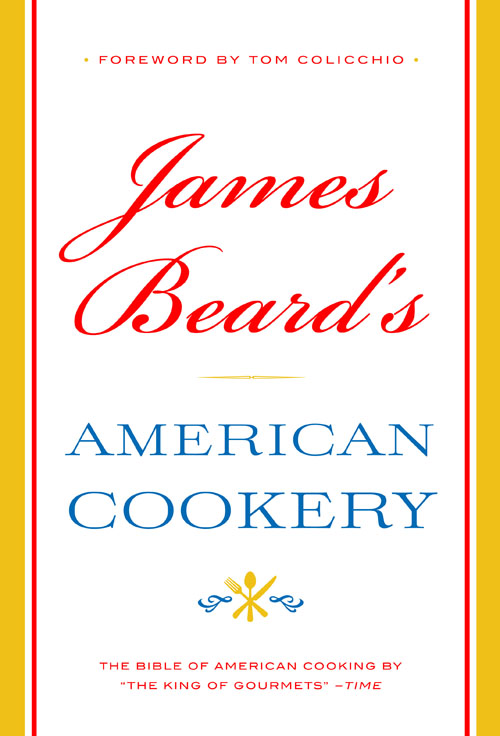
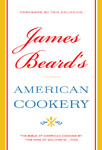
Books by James Beard
James Beards Hors dOeuvres and Canaps
Cook It Outdoors
Fowl and Game Cookery
The Fireside Cookbook
Paris Cuisine (with Alexander Watt)
James Beards Barbecue Cookbook
James Beards New Fish Cookery
The Complete Book of Outdoor Cookery (with Helen Evans Brown)
How to Eat Better for Less Money (with Sam Aaron)
The James Beard Cookbook
James Beards Treasury of Outdoor Cooking
Delights and Prejudices
James Beards Menus for Entertaining
How to Eat (and Drink) Your Way Through a French (or Italian) Menu
James Beards American Cookery
Beard on Bread
Beard on Food
James Beards Theory and Practice of Good Cooking
The New James Beard
Beard on Pasta
Love and Kisses and a Halo of Truffles (John Ferrone, editor)
This book is dedicated to my favorite great ladies of the American kitchen:
Eliza Leslie
Mrs. T.J. Crowen
Sarah Tyson Rorer
Fannie Merritt Farmer
Irma Rombauer
Helen Evans Brown
June Platt
I never met James Beard, but I feel like I know him. In 1984 I was a wet-behind-the-ears young chef in Millburn, New Jersey, working at a restaurant where each days menu was dictated by the greenmarket. To a kid raised on macaroni and Sunday gravy, this was a novel departure, the stepping-off point for a lifetime obsession with seasonal ingredients. And yet I knew enough to realize the concept wasnt new, even if it was only gaining cachet at the time; James Beard had been cooking with high-quality, locally sourced ingredients since the 1950s. On the day he died, we dedicated a menu at 40 Main Street to him. I felt as though a personal mentor had passed away.
As my career has evolved from cook to chef to restaurateur to guy on TV, Im reminded that here James Beard was a pioneer too. Along with Julia Child, he used television as a way of bringing food and cooking into American homes, setting the stage for todays revolution in food programming. One of the things Im proudest of is that hundreds of people write me letters saying that, thanks to Top Chef, their kids have an interest in eating a variety of foods, and the family now cooks together, trying new things and bonding along the way. The show has helped to usher in the very thing that James Beard cared about mostfood as a means of connecting people to loved ones and friends. Would there be a Top Chef today without James Beards first-ever cooking show in 1946? Maybe, maybe not. But he certainly set the stage.
I consider myself an American chef because I was born here, but also because I borrow from all the traditions that have made their way over to our shoresincluding the Italian cooking of my parents and the French of my early trainingwhich is a uniquely American pattern. In this, too, James Beard led the way; just as all politics is local, he felt that all cuisine was regional, because at its core, great cooking is about bringing something personal to the task. James Beard celebrated the regional cuisines of Cajun New Orleans, the Pacific Northwest, and just about everywhere in between. His influence persists in the modern revival of locavore eatingit might feel new to many, but James Beard was preaching that gospel before most of us geniuses were born.
The beauty of this book is that it allows youthe enthusiastic home chef (or armchair cook)to experience firsthand what made James Beard special and unique. His voice can be heard through his no-nonsense recipes and the choices he made that celebrated even simple, humble dishes for what they were: good food.
We hear a lot today about what makes someone a real chefis it the guy at the stove? The one teaching future chefs? The one on TV? The one championing important causes? Or the one traveling with his craft and running a successful business? James Beard showed us a great chef could be all of those things, gracefully and without compromising his ideals, and for that I am truly grateful.
Tom Colicchio
New York City, April 2010
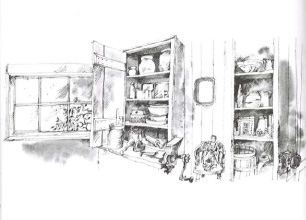
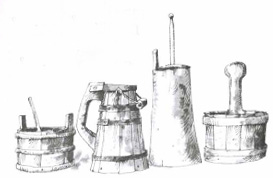
F ood and eating habits have fascinated me throughout my life, and after sixty-five years I have come to the conclusion that perhaps American cookery is one of the most fascinating culinary subjects of all. When I was very young I knew ranch food and other Western-style cooking. I knew elegant hotel food as well as American plan hotel food, with all its faults and its few merits. I have known home cooking all the way from the very simplest to the most luxurious. I have eaten, cooked, observed, and taught in many sections of this country. And I have lived long enough to have experienced the glories of native cookery in the early years of this century, the decline in good cooking that followed the disappearance of hired help from American households, and, since the mid-1940s, a renaissance of interest in food.
Today American cookery is at a crossroads somewhere between technology and tradition. On the one hand we have a tremendous boon of items on the market called convenience foodsprepared dishes, mixes, freeze-dried dishes, frozen foods of all kinds, and complete frozen dinners. While these have seldom improved the American palate they have helped the less enterprising cook, whose approach to food is a matter more of necessity than of creativity, and have permitted some cooks to serve better food than they could ever have produced themselves.
On the other hand we have a widespread vogue for fine traditional cookery. French cuisine is the goal of every amateur in the kitchen. One must do all of the famous provincial dishes, and the bourgeois dishes, and now and again attempt to reconstruct some of the monuments of grande cuisine, an aspiration that often leads the novice into techniques far beyond his depth. Without question it is a delight to follow the meticulously planned trail of Julia Child or read the sublime evocations of Elizabeth David, but we should also look into the annals of our own cuisine. We have so much to complain about in the quality of food served in many restaurants and in not a few homes that we forget what distinguished food Americans have produced in several periods of our history.
The beginnings of a native cuisine must have been modest enough. Quite likely until the end of the eighteenth century and the start of the next, the only food of consequence was to be found in a few great houses in parts of the South and in New York, Boston, and Philadelphia. Elsewhere the food served at many tables was undoubtedly overcooked and underseasoned. As Americans began to travel more and sophistication grew, there was greater daring in making dishes that were not purely functional, and with the arrival of immigrants in number the cultural mix mingled cuisines as well.
Eventually in many small communities excellent natural cooks began to blossom, whom all the local ladies tried to emulate. These gastronomic voices of the hinterland are evident when one peruses collections of recipes compiled by the Ladies Aid societies, missionary societies, hospital volunteer groups, neighborhood houses, and womens exchanges all through the country. It is fascinating to see, for example, how successful recipes inspired envious cooks to compete. Thus we find Mrs. Doctor Joseph Niemyers Chicken with a Savory Sauce turning up in other cookbooks as Chicken with a Savory Sauce or Savory Sauced Chicken. Occasionally a recipe such as Mrs. Niemyers is improved upon, perhaps by a housewife with a different ethnic background. So runs the pattern through all these remarkable paperbound cookbooks for almost two centuries. They, as much as anything, record the history of our cuisine. Through them it is possible to trace the march of recipes westward and to see which of the great recipes survived through generations of change.
Font size:
Interval:
Bookmark:
Similar books «James Beards American Cookery»
Look at similar books to James Beards American Cookery. We have selected literature similar in name and meaning in the hope of providing readers with more options to find new, interesting, not yet read works.
Discussion, reviews of the book James Beards American Cookery and just readers' own opinions. Leave your comments, write what you think about the work, its meaning or the main characters. Specify what exactly you liked and what you didn't like, and why you think so.



